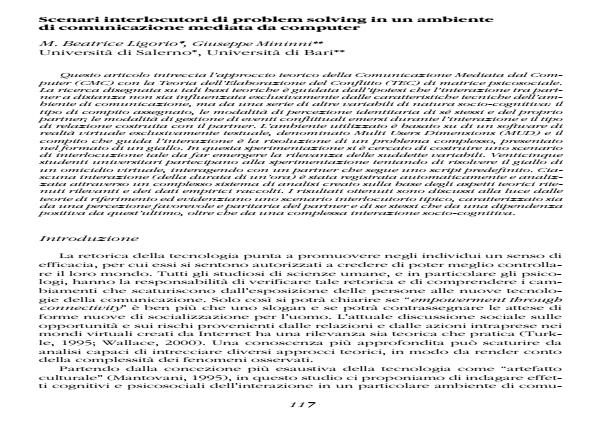Scenari interlocutori di problem solving in un ambiente di comunicazione mediata da computer
Titolo Rivista RASSEGNA DI PSICOLOGIA
Autori/Curatori M. Beatrice Ligorio, Giuseppe Mininni
Anno di pubblicazione 1 Fascicolo 2002/1
Lingua Italiano Numero pagine 13 P. Dimensione file 227 KB
DOI
Il DOI è il codice a barre della proprietà intellettuale: per saperne di più
clicca qui
Qui sotto puoi vedere in anteprima la prima pagina di questo articolo.
Se questo articolo ti interessa, lo puoi acquistare (e scaricare in formato pdf) seguendo le facili indicazioni per acquistare il download credit. Acquista Download Credits per scaricare questo Articolo in formato PDF

FrancoAngeli è membro della Publishers International Linking Association, Inc (PILA)associazione indipendente e non profit per facilitare (attraverso i servizi tecnologici implementati da CrossRef.org) l’accesso degli studiosi ai contenuti digitali nelle pubblicazioni professionali e scientifiche
This article integrates the Computer Mediated Communication (CMC) theoretical ap-proach with Conflict Elaboration Theory (CET) a theory based on psycho-social perspec-tives of human interaction. The hypothesis on which the research was designed led to the prediction that interaction between partners at a distance is not influenced exclusively by the technical features of the communication environment, but rather by a set of other socio-cognitive variables. These variables include the type of task, how personal and partner’s identities are perceived, how conflicts are managed during the interaction, and the type of relationship established between the partners. The interactions took place within a text-based virtual reality environment using software called Multi Users Dimensions (MUD). The task guiding the interaction was a complex problem-solving scenario presented as a mystery game. The interlocution of the scenario permits the variables considered as salient to emerge. Twenty-five university students participated to the game trying to solve the mystery of a virtual murder, interacting with a partner that follows a predefined script. Each interac-tion (of more or less one hour) was recorded automatically and later analysed through a complex analysis system created on the basis of both the theoretical framework and the em-pirical data collected. The results obtained are discussed in light of the theories guiding the research. A typical interlocution scenario emerged and was characterized by a positive and equal identity perception of participants and of the partners, a positive interdependency be-tween the two partners, and a complex socio-cognitive interaction.
M. Beatrice Ligorio, Giuseppe Mininni, Scenari interlocutori di problem solving in un ambiente di comunicazione mediata da computer in "RASSEGNA DI PSICOLOGIA" 1/2002, pp , DOI: